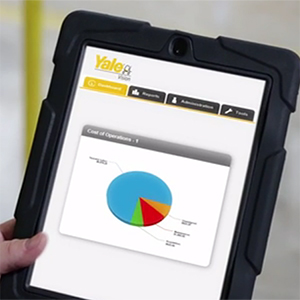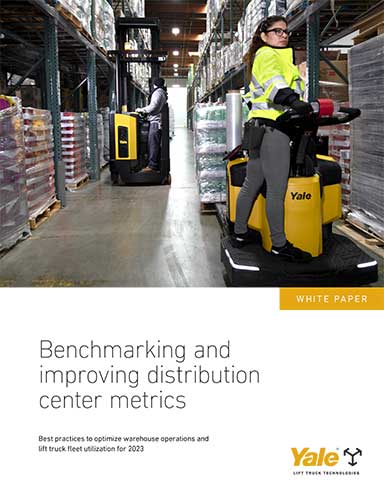Lift Truck Data Helps to Shape Power Consumption Options

The growing reach of telemetry means power decisions are fueled by a greater amount of available data.
Not so long ago, the decision to review a lift truck fleet’s fuel source—never mind actually adopting a new technology—was quite low on the list of priorities.
Many have transitioned from internal combustion (IC) to electric platforms in the past decade, but the economic factors created the justification, making those decisions fairly straightforward.
Without a clear and sizable return on investment, the status quo prevailed for some. This challenged alternative power sources like hydrogen fuel cells, lithium-ion and opportunity or rapid charging technologies to find compelling arguments for their viability.
At the same time, lift truck telematics and fleet management software set out to collect and make sense of granular data for each piece of equipment and its environment. This information can model fuel use patterns, offer predictions and determine whether an operation—or segment of an operation—is a good candidate for hydrogen fuel cells, lithium-ion or opportunity charging systems.
As with any technology, telematics and data capture solutions are not a silver bullet, and the best results require a healthy dose of discipline and forward thinking. Big or small, the fleets that have used data and taken steps to revisit power options often found opportunities for improvements that extended far beyond battery life or propane consumption.
According to Mick McCormick, vice president of warehouse solutions for Yale Materials Handling Corp., the path to optimizing a fleet’s energy consumption begins with an accurate picture of current usage patterns. Whether deployed as a stand-alone product or part of a wider data collection effort, battery-monitoring devices can turn assumptions and after-the-fact reports into actionable data.
“Every lift truck application has a set of rules and standard operating procedures around fuel usage, but it can be very difficult to ensure those practices are being followed,” McCormick says.
“With the right information, you can make better decisions about managing a fleet, and you’ll have the visibility to prove that best practices are being followed.”
Operator behavior is a big part of power management, and it’s no small challenge for managers to provide incentives for good performers or remediation for poor ones. In terms of power management, McCormick says proper battery equalization and watering are the most common failings of electric fleets. He says data collection technologies can answer two key questions: Who are the noncompliant operators? And, do they know they are noncompliant?
“The answer to that second question is not always obvious,” McCormick says.
“But once we start measuring, we can start to change behaviors. This is not a one-time or quarterly event, but should be part of daily work.”
Discipline will produce a better picture of a fleet’s true energy consumption, which in turn can be used to pursue savings with fuel providers. It might be possible to reduce or eliminate forklift-related electricity usage during peak demand, or to renegotiate an overall cost per kilowatt-hour. Batteries are among the largest electricity consumers for many facilities and, if the fleet data suggests moving away from electricity, hydrogen fuel cells are an alternative.
Best practices for battery management
- Assess the operation to ensure batteries and chargers are sized correctly and the right quantity for the needs of the application.
- Continuously measure the performance of the system throughout the year. Performance may change as a result of seasonal temperature changes, for example.
- Regularly maintain the battery chargers and ensure settings are appropriate.
- Implement a battery management system to ensure proper battery rotation and equalization.
- Actively manage the battery water levels through monitoring and corrective action.
Related: Yale Highlights Alternative Power Options and Autonomous Equipment 
Related White Papers
Working with Small Data to Optimize Fleet Size and Labor
The importance of extracting actionable insights and data from lift truck telematics to improve efficiency and protect the bottom line. Download Now!
The Adoption of Hydrogen Fuel Cell-Powered Lift Trucks
Deploying hydrogen fuel cells can offer a cleaner, safer workplace and significant productivity and financial advantages over other electric lift truck options. Download Now!
Article Topics
Yale News & Resources
Should you lease or buy your lift truck fleet? Electric Trucks are Poised to Tackle the Pressures of E-commerce Improving Distribution Center Metrics New Technology Can Give Lift Truck Operators a Hand 2022 Warehouse Benchmarks Study 70% of forklift accidents in the United States are preventable Robotic lift trucks can cut operating expenses up to 70% More YaleLatest in Warehouse|DC
Spotlight Startup: Cart.com is Reimagining Logistics Walmart and Swisslog Expand Partnership with New Texas Facility Taking Stock of Today’s Robotics Market and What the Future Holds U.S. Manufacturing Gains Momentum After Another Strong Month Biden Gives Samsung $6.4 Billion For Texas Semiconductor Plants Walmart Unleashes Autonomous Lift Trucks at Four High-Tech DCs Plastic Pollution is a Problem Many Companies are Still Ignoring More Warehouse|DCAbout the Author

















